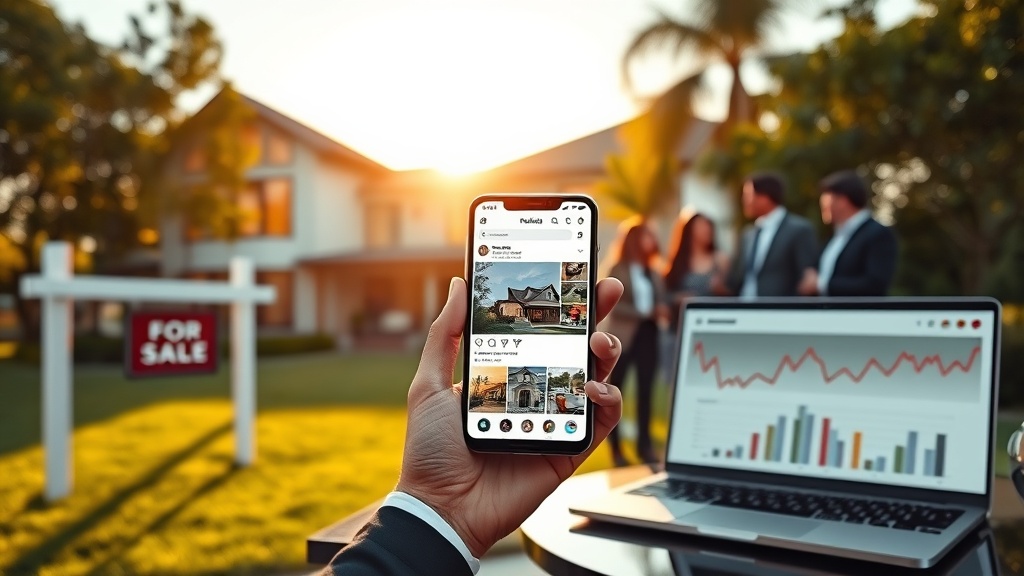How Social Media Marketing is Revolutionizing Real Estate Sales

" "
In the past decade, the real estate industry has been experiencing a transformative shift. What was once a field heavily reliant on traditional marketing methods like print ads, open houses, and word of mouth, is now embracing the digital age with open arms. At the forefront of this digital revolution is social media marketing. This powerful tool has become indispensable for real estate professionals aiming to expand their reach, engage with potential clients, and ultimately close more sales. In this blog post, we'll explore how social media marketing is revolutionizing real estate sales, the current trends shaping this transformation, and what the future may hold.
Historical Context: The Evolution of Real Estate Marketing
To fully appreciate the impact of social media, it's essential to understand how real estate marketing has evolved over the years. Traditionally, real estate agents relied on:
- Newspaper Listings: Print ads were a primary method of showcasing properties to potential buyers.
- Open Houses: Hosting open houses was a way to attract foot traffic and engage directly with interested parties.
- Cold Calling: Agents would reach out to potential clients through phone calls, often without any prior contact.
- Word of Mouth: Referrals from satisfied clients were crucial for building a reputable business.
While these methods were effective for many years, they had their limitations in terms of reach and efficiency. Enter the digital age, where the internet began to change the landscape dramatically and set the stage for social media's pivotal role.
The Rise of Social Media in Real Estate
Social media platforms such as Facebook, Instagram, Twitter, LinkedIn, and YouTube have become integral to real estate marketing strategies. Here’s why they’ve been so successful:
1. Increased Reach and Targeting
Social media allows real estate professionals to reach a broader audience than traditional methods ever could. With billions of users globally, platforms like Facebook and Instagram offer unparalleled access to potential buyers. Moreover, these platforms provide sophisticated targeting options, enabling agents to focus their efforts on specific demographics, such as age, location, income, and interests.
Real-World Scenario: A real estate agency in Miami uses Facebook Ads to target millennials interested in purchasing beachfront properties. By using location and interest-based targeting, they reach potential buyers who are not just in Miami but across the country, significantly increasing their pool of interested clients.
2. Enhanced Engagement and Relationship Building
Social media is not just about broadcasting listings; it's about building relationships. Platforms like Instagram and Facebook allow agents to engage with their audience through comments, direct messages, and interactive content.
Real-World Scenario: An agent regularly shares behind-the-scenes content on Instagram Stories, showing the journey of renovating a property. By engaging with followers through polls and Q&A sessions, they create a sense of community and trust, making followers more likely to reach out when ready to buy or sell.
3. Visual Storytelling Through High-Quality Content
Real estate is a visual industry, and social media excels in this regard. Platforms like Instagram and Pinterest are perfect for showcasing stunning property photos and virtual tours. High-quality visuals can capture attention and evoke emotions, which are crucial in the decision-making process of buying a home.
Real-World Scenario: A real estate team utilizes drone footage to capture aerial views of properties and surrounding neighborhoods. By posting these captivating videos on YouTube and Instagram, they provide a unique perspective that traditional photos cannot, attracting more views and inquiries.
4. Cost-Effective Advertising
Compared to traditional advertising methods like print media or billboards, social media advertising is incredibly cost-effective. Real estate agents can set specific budgets and only pay for the results they achieve, such as clicks or impressions.
Real-World Scenario: A small real estate agency with a limited marketing budget uses Instagram Ads to promote a new housing development. By allocating a modest budget, they reach thousands of potential buyers and generate dozens of leads, all for a fraction of the cost of a newspaper ad.
Current Trends in Social Media Marketing for Real Estate
As social media continues to evolve, so too do the strategies employed by real estate professionals. Here are some current trends that are shaping the industry:
1. Live Streaming and Virtual Tours
With the advent of live streaming on platforms like Facebook and Instagram, agents can now host live open houses, allowing potential buyers to tour properties from the comfort of their homes. This trend gained significant traction during the COVID-19 pandemic and continues to be popular due to its convenience.
Real-World Scenario: A real estate agent hosts a Facebook Live event, walking viewers through a new listing. Viewers can ask questions in real-time, and the agent can address them immediately, creating an interactive and engaging experience.
2. Influencer Collaborations
Influencer marketing has made its way into real estate, with agents partnering with local influencers to expand their reach and credibility. Influencers can showcase properties to their followers, providing social proof and building trust.
Real-World Scenario: A luxury real estate firm partners with a lifestyle influencer to showcase a high-end penthouse. The influencer shares their experience on Instagram, reaching an audience that trusts their opinion and is interested in luxury living.
3. User-Generated Content
Encouraging clients to share their experiences on social media can be a powerful marketing tool. User-generated content acts as a testimonial and can significantly influence the decision-making process for potential buyers.
Real-World Scenario: A happy client posts a photo of their new home on Instagram, tagging the real estate agent and sharing their positive experience. This authentic endorsement reaches their network, potentially leading to new referrals.
4. Data-Driven Strategies
Social media platforms provide valuable insights into audience behavior and preferences. Real estate professionals are increasingly leveraging this data to refine their marketing strategies and deliver more personalized content.
Real-World Scenario: By analyzing Instagram Insights, a real estate agent discovers that posts featuring neighborhood highlights receive more engagement than property listings. They adjust their content strategy to include more community-focused posts, leading to increased interaction and followers.
Potential Future Implications
The future of social media marketing in real estate looks promising, with several potential developments on the horizon:
1. Integration of Augmented Reality (AR)
As AR technology advances, it may become commonplace in real estate marketing. Imagine potential buyers using AR to visualize how a property would look with different furniture or decor, enhancing the decision-making process.
2. Increased Use of AI and Automation
Artificial intelligence and automation could revolutionize how agents manage social media accounts, from scheduling posts to analyzing data. Chatbots powered by AI may also become more prevalent, providing instant responses to inquiries and improving customer service.
3. Expansion of Niche Platforms
While Facebook and Instagram dominate, niche platforms like TikTok and Clubhouse are gaining popularity. Real estate professionals may begin to explore these platforms to reach younger audiences and experiment with new content formats.
4. Greater Emphasis on Sustainability and Community
As consumers become more conscious of sustainability, real estate marketing may focus more on promoting eco-friendly properties and highlighting community benefits. Social media can play a pivotal role in showcasing these aspects and attracting environmentally conscious buyers.
Conclusion
Social media marketing is undeniably revolutionizing real estate sales. By offering increased reach, engagement, and cost-effective advertising, it empowers real estate professionals to connect with clients in ways that were previously unimaginable. As the landscape continues to evolve, staying ahead of the trends and embracing new technologies will be crucial for success.
Whether you're a seasoned real estate agent or just starting in the industry, harnessing the power of social media is no longer optional—it's essential. As we look to the future, the possibilities are endless, and those who adapt and innovate will undoubtedly thrive in this dynamic and ever-changing field.











